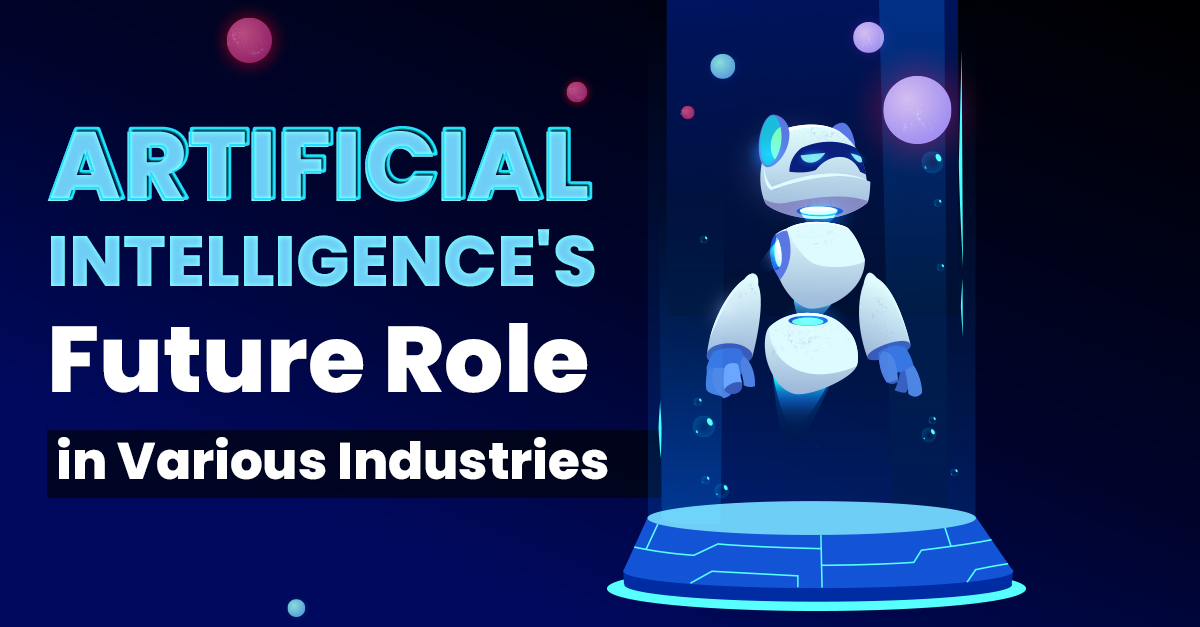#Artificial Intelligence’s Future Role in Various Industries

Table of Contents
Artificial Intelligence’s Future Role in Various Industries
The power of Artificial Intelligence (AI), which has been a popular topic for a while, is currently being recognized in a wide range of industries. AI has been changing how we conduct business, learn, and live our lives in a variety of sectors, including Healthcare, Banking, Education, and Transportation. Yet this is just the beginning; as AI develops and becomes more sophisticated, its impact will only grow. This blog is intended to make you understand the future role of AI in various fields.

AI has the ability to change how we work and live entirely, and it will play an increasingly important role in the coming years. The job market will be one of the areas where AI has the most prominent effects. AI will create new jobs, and simultaneously it will also replace some existing jobs.
However, the new jobs that will emerge will require knowledge, creativity, and critical thinking skills. Join the AI revolution and discover your potential by watching the best expert-led Artificial Intelligence Course, designed to prepare you with the knowledge and practical skills to succeed in this rapidly growing field.
AI’s Future Role in Various Industries
We will cover AI’s future role and how it is changing the way industries work. Moreover, how AI is shaping the future of top industries including Information Technology, Healthcare, Transportation, Education, and Retail. Unlock the potential of AI, with this engaging video on Artificial Intelligence Training, which offers in-depth dive into the core principles and practical applications.
Here is an overview of Artificial Intelligence’s future role in some of the major industries:
- Information Technology
In the upcoming years, Artificial Intelligence (AI) has the potential to completely transform the Information Technology (IT) sector. Businesses are utilizing AI in increasing numbers to improve their operations and gain a competitive edge in the market as a result of the significant advancements in AI technologies.
AI will be essential in the future of the IT sector in a number of areas, including cybersecurity, data analysis, automation, and customer service.
- AI-powered security systems can help identify and mitigate potential threats in real-time, while AI-based data analytics can enable businesses to gain valuable insights and make informed decisions.
- Also, AI will keep playing a crucial part in automation, making processes faster, and improving operations. Customer service is another industry where AI is expected to have a big impact.
- Chatbots and virtual assistants will become more intelligent and capable of understanding complex customer needs, enabling businesses to provide personalized and efficient support to their customers.
- Healthcare
Artificial Intelligence (AI) is already having a big impact on the healthcare sector, and it has the potential to completely change it in the future. The development of new drugs as well as diagnostics, and the prevention, and treatment of disease could all be revolutionized by AI-powered devices.
- AI has the ability to accurately and quickly analyze huge amounts of information, which is one of the most important advantages AI has for the healthcare industry.
- AI algorithms can analyze patient data to find trends, predict outcomes, and suggest treatments. This can help medical professionals in providing more accurate diagnoses, more individualized treatment plans, and better decision-making.
- AI is also playing a critical role in drug discovery, using predictive algorithms to identify promising drug candidates, speeding up the process, and reducing costs.
- Transportation
In the coming years, Artificial Intelligence (AI) is expected to significantly impact the transportation sector and transform how passengers and products are transported.
- AI-driven technologies can improve safety on the roads, reduce traffic, and improve route planning for more effective transportation of goods and passengers.
- Self-driving cars and trucks are expected to rise in demand, which will minimize the need for human drivers and possibly result in safer roads with fewer accidents.
- AI-driven transportation systems can also help in lowering emissions and fuel usage, which will help in reducing pollution.
- Moreover, AI has the potential to significantly improve the customer experience through automated ticketing systems, real-time route information, and personalized recommendations based on passenger preferences.
- Education
In the years ahead, Artificial Intelligence (AI) is expected to completely change the education system by improving the efficiency, effectiveness, and personalization of teaching.
- AI-powered tools can help instructors in analyzing massive amounts of information to find trends, estimate outcomes, and offer individual learning suggestions. This can help teachers in modifying their lesson plans to better meet the needs of students accordingly.
- In regions with limited access to educational resources, AI can also help close the education gap. For example, in remote locations, AI-powered teaching systems can give students access to high-quality educational materials and assistance.
- Also, AI can play a critical role in improving student engagement, providing real-time feedback and support, and enabling more effective assessments.
- Retail
In the upcoming years, Artificial Intelligence (AI) has the chance to completely alter the retail sector by revolutionizing how businesses deal with customers, manage their goods, and simplify their operations.
- With the development of AI-powered technologies, retailers can offer customers more efficient and personalized shopping experiences.
- Artificial intelligence can help businesses in analyzing massive volumes of customer data to find trends and predict customer behavior. Retailers may be able to better serve their customers by using personalized recommendations, offers, and pricing models.
- Moreover, AI can help retailers improve their supply chain management, predicting demand and automating inventory management. This can help reduce waste, improve efficiency, and lower costs.
Conclusion
Businesses that use Artificial Intelligence(AI) will have a huge competitive edge as it has enormous potential. In the coming times, the ability of AI to learn and adapt in real time will allow it to make more accurate predictions and offer personalized solutions. As a result, one can expect significant developments in areas like machine learning, computer vision, and natural language processing.
Yet, there are also worries regarding job loss and data privacy because of the adoption of AI. In order to ensure that AI is used for the benefit of the entire society, it is necessary to find a balance between the advantages of the technology and the possible risks and difficulties involved with its implementation.
by Megha Garhkoti
If you liked the article, do not forget to share it with your friends. Follow us on Google News too, click on the star and choose us from your favorites.
For forums sites go to Forum.BuradaBiliyorum.Com
If you want to read more like this article, you can visit our Technology category.




Thank you for sharing this informative article on AI’s future role in various industries. Your insights provide a clear understanding of AI’s potential impact. Great job!